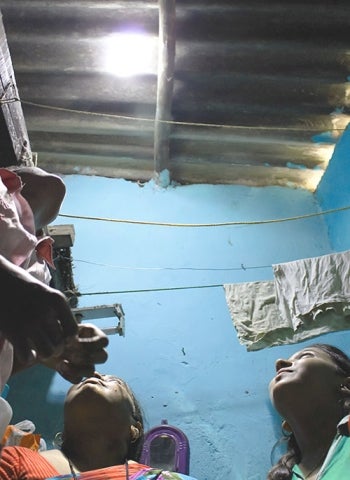Note: Yale School of the Environment (YSE) was formerly known as the Yale School of Forestry & Environmental Studies (F&ES). News articles and events posted prior to July 1, 2020 refer to the School's name at that time.
 A one-liter water bottle wedged into a corrugated rooftop uses properties of refraction to provide a low-cost source of illumination — the rough equivalent of a 55-watt bulb.
A one-liter water bottle wedged into a corrugated rooftop uses properties of refraction to provide a low-cost source of illumination — the rough equivalent of a 55-watt bulb.
A few years back, while teaching environmental science to students in a slum neighborhood of Mumbai, Sanjna Malpani ’17 M.E.M. was alarmed to find that many of the students weren’t completing their homework assignments.
The reason they weren’t finishing their work changed the course of her life.
“Their constant excuse was that they didn’t have light at home — even during the daylight hours,” says Malpani, now a second-year masters student at the Yale School of Forestry & Environmental Studies. “I was taken aback by this, Mumbai has sun practically the whole year.”
 Sanjna Malpani
Sanjna Malpani
After visiting one of the student’s homes she started to understand the problem. In some areas homes were packed together so tightly that there simply weren’t many points for natural light to enter households. And even those families with access to electricity used it sparingly because of costs, she said, and in many households the schoolwork needs of children were not a priority.
“I didn’t realize this was happening,” says Malpani, a Mumbai native who at the time was a student at St. Xavier’s College. “And so I started looking for solutions for how this problem could be overcome.”
Soon after, Malpani and some friends created Jal Jyoti, a social venture that has provided low-cost light sources — the rough equivalent of a 55-watt bulb — to more than 160 Indian homes using nothing more than recycled plastic bottles, water, and the properties of refraction.
That venture recently earned Malpani
a 2017 OneEnergy Scholarship, which recognizes graduate students who have demonstrated exceptional leadership and vision in the renewable energy field. The program provides several opportunities to help boost their careers, including mentorship from industry professionals, personalized career counseling, internships and networking prospects.
The scholarship is sponsored by OneEnergy Renewables, a leading developer of utility-scale clean energy projects, and Net Impact, a nonprofit that empowers transformational change in the workplace and the world.
“Of the many applications we received for the 2017 Energy Scholar program, Sanjna’s entrepreneurial spirit and success in breaking down barriers to access to renewable energy were standouts to our review team,” said
Jennifer Barnes, vice president of operations and communications at OneEnergy Renewables. “Not only does Sanjna exemplify the type of leadership the clean energy sector needs both now and in the future, but she is doing so in a sector that is statistically the furthest behind in advancing women and other minorities.
“Sanjna has consistently proven all of these longstanding barriers can be broken and she has done so with grace and success. We believe Sanjna will continue to exemplify what the renewable energy industry needs for innovation and advancement and we are pleased to support her career.”
When Malpani started contemplating ways to address the challenge of lighting Mumbai’s households, her thoughts initially turned to solar power. But she soon found that a number of complications — high costs, not the least — would have made it a difficult match.

Then she encountered a simple innovation developed by a Brazilian mechanic, Alfredo Moser, which was being used to provide light at almost no cost in poor communities worldwide. Within a decade of its invention, in 2002, the so-called “Moser lamp” was being used in at least 15 countries, including the Philippines where it had been installed in more than 140,000 homes.
Along with some of her classmates, Malpani convinced a Mumbai homeowner to allow them to climb onto their rooftop, where they cut a small hole in the corrugated surface and installed a piece of fiberglass bisected by one-liter plastic bottle. Inside the bottle were water and a dash of bleach (to prevent algae growth).
“If you tell people, ‘I’m going to drill a hole in your roof, put a bottle there, and it’s going to give you light’ it sounds crazy,” Malpani says now. “We weren’t even fully convinced until we did that first installation that it would work. But we found that as long as there’s sunlight outside the house, it becomes refracted inside the water, and in a small room — about 10-feet-by-10-feet — one bottle can provide illumination equivalent to a 55-watt bulb.”
Once they had installed bottles on a couple of additional rooftops, other neighbors started asking them to do the same on their homes. Soon they began working with another team, from Switzerland, that had been doing installations across the world and which helped them hone their skills.
Next Steps...
Sanjna Malpani, who graduates from Yale in May, believes solar power still offers enormous potential to meet many of the developing world’s power and illumination challenges. One of the possible solutions she’d like to pursue after graduation is a “pay-as-you-go” model that allows households to buy solar-powered electricity as needed using apps available on even the cheapest cellphones.
“Even if you don’t have a smart phone, you can use GSM-enabled phones that enable you to do this through texting,” she says. “Today’s cheap phones allow you to pay your bills, make bank transfers, get weather forecasts. Perhaps this is another service that they can be used to provide.”
Then they started working with a local NGO that helped connect Jal Jyoti with potential customers, ultimately introducing them to more than 100 households.
Malpani says she never intended for the project to become a business, although she says the Bottled Light concept has inspired Pepsi, which has provided “lamps” to thousands of homes in India and elsewhere. And that’s really what she wanted all along — to show as many people as possible that there are low-cost ways to address what is a problem in many countries.
“What I like most about this method was the fact that it was just so low-cost and that anybody could do it,” she says. “Of course it does have its limitations, but I saw it as a first step toward addressing a much bigger problem, which is that of electrification across India and across most of the world’s developing countries.”
 A one-liter water bottle wedged into a corrugated rooftop uses properties of refraction to provide a low-cost source of illumination — the rough equivalent of a 55-watt bulb.
A one-liter water bottle wedged into a corrugated rooftop uses properties of refraction to provide a low-cost source of illumination — the rough equivalent of a 55-watt bulb.
 Sanjna Malpani
Sanjna Malpani
